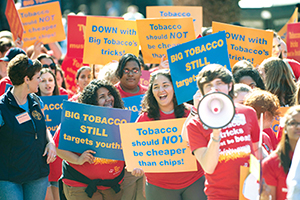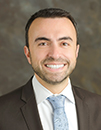A grant from Trinity Health is the first by a major institution to assist a new national campaign to raise the age for buying tobacco products to 21.

Members of The 84, an organization named when 84 percent of Massachusetts youth didn't smoke cigarettes, rally in Boston in March of 2012. The gathering was part of Kick Butts Day, a national day of activism organized by the Campaign for Tobacco-Free Kids. The 84 says now 89 percent of the state's youth are tobacco free.
(Photo courtesy of Health Resources in Action/The 84)
Trinity Health of Livonia, Mich., has joined with the Campaign for Tobacco-Free Kids, an advocacy organization, to promote raising the age through changes in local, state and federal laws. Two states and more than 185 cities, many of them in Massachusetts, already require people to be 21 to buy cigarettes, chewing tobacco and other products. Federal law now requires buyers to be 18.
Dr. Bechara Choucair, senior vice president for safety net and community health for Trinity, said the system's agreement with the Campaign for Tobacco-Free Kids "is all about building momentum for community change." Trinity Health's grant is for $100,000 in each of five years.
John Schachter, the campaign's director of state communications, said the partnership "will help support this policy with medical and public health expertise. It adds great weight to our arguments."

Choucair
Schachter said the campaign will use the grant to help finance efforts to create and publish educational materials, promote coalitions with local organizations and develop training for volunteer advocates. The Washington, D.C.-based campaign has five regional offices that work with state and local organizations, such as the chapters of the American Cancer Society and American Heart Association, to ban smoking in public establishments and workplaces, raise taxes on tobacco products and increase the age of purchase.
Schachter said raising the age is a relatively new part of the organization's work, which means that Trinity Health's partnership "is really going to help expand this campaign. It will beef up our ability to conduct research and outreach, and we can reach into more states and communities to tackle this issue."
He said Trinity Health was the first large institution to help finance the new effort, called Tobacco 21.
The Campaign for Tobacco-Free Kids was founded in 1996, but the big boost for the effort to raise the purchase age was a study in March 2015 by the Institute of Medicine in Washington, D.C. It says doing so will significantly reduce the number of people who begin smoking and, over time, reduce by about 12 percent the number of adults who smoke. The institute now is called the Health and Medicine Division of the National Academies of Sciences, Engineering and Medicine.
The Campaign for Tobacco-Free Kids says that 95 percent of all smokers began their habit before they were 21 years old.
Choucair said the grant and partnership is part of Trinity Health's "Transforming Communities" initiative to promote community health. He said one of the main themes of the initiative is to reform public policies in order to encourage healthier behavior.
"You have to reach out to potential smokers and engage them," Choucair said. "With youth, a lot of that effort is to keep them from smoking that first cigarette. With this partnership, we bring nurses and doctors to the table who can weigh in on the reasons to change policy."
Schachter said Trinity Health personnel can work with local organizers and activists to promote the reform before municipal councils and state legislatures. He said support for the change "has emerged pretty quickly, and we believe it is taking off."
Hawaii became the first state to raise the purchase age to 21 with a law that took effect Jan. 1. But only three weeks later, New Jersey Gov. Chris Christie used his "pocket veto" to thwart a legislative act raising the age in that state from 19 to 21. California raised its age to 21 in May.
In April, Trinity Health took part in a briefing in Washington for members of Congress, where bills have been filed to raise the age across the nation.
Said Choucair, "We know that Big Tobacco is tough. But that doesn't mean we give up."
Cigarette smoking continues to decline in the United States, falling from 42 percent of adults in 1965 to 15 percent in 2015, according to the Centers for Disease Control and Prevention. The CDC says smoking among high school students has fallen from 36.4 percent in 1997 to 10.8 percent in 2015.
But cigarette smoking still is the leading cause of preventable death, says the Campaign for Tobacco-Free Kids, causing about 480,000 deaths each year and costing $170 billion in medical expenses.
"Raising the minimum age will help save lives, and that is our core business," Choucair said.
Copyright © 2016 by the Catholic Health Association of the United States
For reprint permission, contact Betty Crosby or call (314) 253-3477.